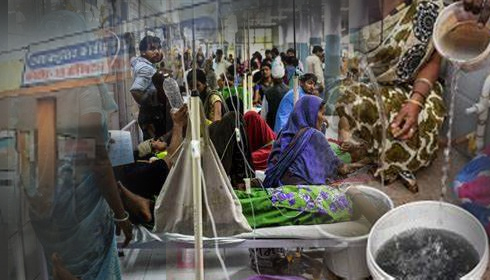
Suspected Food Poisoning in Thane Private School Leaves 45 Students Hospitalised
A suspected food poisoning outbreak in a private school near Thane has hospitalized 45 children, raising concerns about the safety of midday meals provided in educational institutions. Hospital officials said the youngsters, who ranged in age from 8 to 11, were sick after lunch on Tuesday and had giddiness, nausea, headaches, and stomach discomfort. This episode has spurred the Food and Drug Administration (FDA) and Thane Municipal Corporation (TMC) to probe food quality issues.
The problem started on Tuesday afternoon when Kalwa Civil Hospital admitted 38 children. Later that evening, the hospital admitted seven more students, adding to the total of 45 impacted children. Dr. Aniruddha Malgaonkar, the hospital's Medical-In-Charge, reassured the students that they were responding well to therapy and would likely be discharged soon if their condition continued to improve. Right now, all the children are considered safe.
As soon as the word leaked, parents of the afflicted youngsters hurried to the hospital, clearly worried about their children's health. Once the symptoms started to get worse, the school administration moved fast, arranging ambulances to carry the sick pupils to the hospital. The prompt action likely prevented further serious health consequences.
The school had given the kids a midday lunch, according to TMC Additional Commissioner Sandeep Malvi. The midday meal consisted of rice and moth bean curry, a frequent dish in school lunches all over the area. Locally known as matki. Food samples gathered by FDA inspectors are now being analyzed to identify the precise source of potential food poisoning.
Five students reportedly complained of pain soon after lunch, according to first accounts, but the count shortly increased as additional kids started showing symptoms. This has raised concerns about the likelihood of food contamination, whether during cooking or delivery.
Local officials responded to the incident by acting quickly and legally. Under Bharatiya Nyaya Sanhita Section 125, the Kalwa police have filed a First Information Report (FIR) against the administration of the private school and the food supplier for threatening the safety or lives of others through careless or reckless actions. One of the affected children's parents complained, which sparked this action.
The FDA's involvement in this matter is particularly noteworthy because it emphasizes the importance of strict food control in educational institutions. The FDA should look closely at not only the meal quality, but also the hygienic standards followed by the food provider and the institution.
This episode is not isolated from the others. In recent years, reports from all over the country have linked midday meals to food poisoning incidents in educational environments. These incidents raise significant concerns about the safety protocols for food distribution and preparation in educational settings, which serve millions of children daily.
Although midday meal programs are crucial to guarantee that low-income children get enough food, such events can erode public trust in these projects. To stop such events in the future, they further emphasize the importance of more rigorous monitoring and following food safety standards.
As the impacted children heal, the focus now shifts to the FDA's and local authorities' inquiries. Based on the results, we will ascertain whether this amounted to contamination or negligence and act appropriately against the accountable parties. In the meantime, the tragedy reminds us sharply of the need for food safety, especially in places like schools where children are more at risk.
While parents and the public anxiously await the inquiry's conclusion, authorities should inspect the procedures for preparing and serving midday meals to ensure such incidents don't happen again.